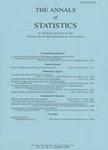-
作者:FAN, JQ; TRUONG, YK
作者单位:University of North Carolina; University of North Carolina Chapel Hill
摘要:The effect of errors in variables in nonparametric regression estimation is examined. To account for errors in covariates, deconvolution is involved in the construction of a new class of kernel estimators. It is shown that optimal local and global rates of convergence of these kernel estimators can be characterized by the tail behavior of the characteristic function of the error distribution. In fact, there are two types of rates of convergence according to whether the error is ordinary smooth...
-
作者:KURIKI, S
摘要:Let H and G be independently distributed according to the Wishart distributions W(m)(M, PHI) and W(m)(N, PSI), respectively. We derive the limiting null distributions of the likelihood ratio criteria for testing H-0: PHI = PSI against H-1 - H-0 with H-1: PHI greater-than-or-equal-to PSI; and for testing H-0(R): PHI greater-than-or-equal-to PSI rank(PHI - PSI) less-than-or-equal-to R (for given R) against H-1 - H-0(R). They are particular cases of the chi-bar-squared distributions.
-
作者:COX, DD
摘要:The observation model y(i) = beta(i/n) + epsilon(i), 1 less-than-or-equal-to i less-than-or-equal-to n, is considered, where the epsilon's are i.i.d. with mean zero and variance sigma2 and beta is an unknown smooth function. A Gaussian prior distribution is specified by assuming beta is the solution of a high order stochastic differential equation. The estimation error delta = beta - beta is analyzed, where beta is the posterior expectation of beta. Asymptotic posterior and sampling distributi...
-
作者:GILARDONI, GL; CLAYTON, MK
作者单位:University of Illinois System; University of Illinois Chicago; University of Illinois Chicago Hospital; University of Wisconsin System; University of Wisconsin Madison
摘要:We consider a group of k experts each having a subjective probability distribution for a parameter theta. If the members of the group are allowed to know the others' opinions and they appreciate the others' skills, it is likely that each expert will modify his distribution to account for this new information. This process can be continued indefinitely leading to an iterative pooling process. The main issue is whether the experts' distributions will converge towards a common limit or consensus....

